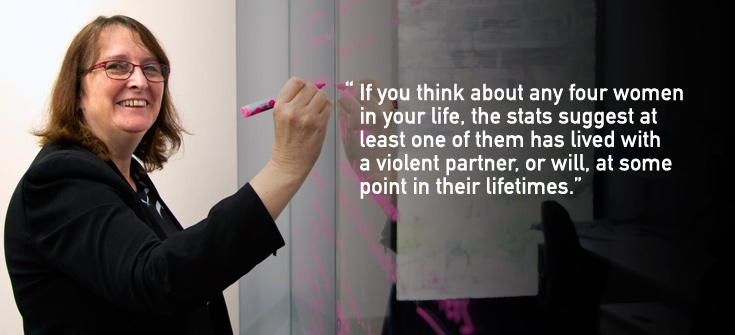Researcher Highlights
Promoting women’s health across the lifespan
Associate Professor Deb Loxton
A passionate woman’s health advocate and researcher, Professor Deb Loxton is shining a light on the most pressing health issues facing women today—including the lifetime health implications for women living with a violent partner and the health deficits affecting mums and babies globally.

Co-director of the University’s Centre for Women's Health Research, Professor Deb Loxton has been at the forefront of women’s health research in Australia for almost two decades.
Deb’s work provides crucial insights into factors affecting women’s long-term health. This includes researching risk factors and health outcomes for women with experience of domestic violence. The dedicated women’s health researcher is also exploring maternal and infant health with the aim of reducing worldwide rates of mortality and morbidity. Across all her work, Deb is committed to seeing research translate into action and answers for women.
Tracking women’s health in Australia
Deb is the Deputy Director of the globally significant Australian Longitudinal Study on Women’s Health (ALSWH). The study started in 1996 and tracks four generations of more than 57,000 women, exploring a range of health outcomes—including the life-long health impacts of domestic violence.
“I am fortunate that as Deputy Director of the ALSWH, I have been able to include comprehensive measures of abuse in this study, making it one of the most comprehensive sources of information about violence against women in the world.”
The study was the first to investigate the health impacts of domestic violence over such a long period of time.
“Violence is a big term, and incorporates emotional abuse, financial abuse, physical abuse, sexual abuse and harassment.
“If you think about any four women in your life, the stats suggest at least one of them has lived with a violent partner, or will, at some point in their lifetime.
“And it doesn't just happen to people who live a certain sort of a life, it happens across the board.”
The hidden scars of domestic violence
Drawing on the ALSWH data, Deb now researches how living with a violent partner can affect a women’s health long term, and their recovery from that experience.
Her research reveals that the impact of domestic violence on physical and mental health can last for decades—and potentially for a lifetime.
“My research continues to highlight the long-term impact and costs associated with violence against women in Australia.
“We have data showing women 15 years post-violence with the same deficit in physical and mental health that they had when they were in the relationship.”
Deb explains that violence can lead to an array of complex health problems, including depression, anxiety, and even chronic pain and diseases such as cervical cancer. Deb is particularly interested in the cumulative impact of different experiences of abuse, such as abuse in childhood followed by violence in later life. Her goal is to identify factors that facilitate recovery, so solutions can follow.
“Abuse and adversity in childhood is related to long-term health behaviour issues and a variety of health problems, both physical and psychological.
“The stretch target of my research is to find those factors, life events and supports that will enable women to fully recover from abuse, whenever it is experienced in the lifespan.”
Deb’s research findings are now helping to improve Australia’s response to this national public health issue. For example, they were used to inform the Australian women’s health policy 2010 and strategy 2019. In 2015, Deb was invited to contribute to the Australian Human Right’s Commission expert roundtable, as part of a national consultation to examine the impact of domestic and family violence on children.
“What I like best is seeing where the research goes and what it does for people. For example, from our ongoing research, we know social support can be very helpful. Women with social support, like accessible psychological care or support networks, do better in the long-term.”
Better health for mums and babies worldwide
Alongside domestic violence, Deb is involved in collaborative research into maternal and infant mortality and morbidity.
Despite global progress towards reducing maternal and infant mortality rates, the situation remains dire for millions of mums and babies worldwide.
The 2015 Millennium Development Goals to reduce these rates was not achieved in many low-middle income countries. In Australia, some adverse birth outcomes and maternal mental health remain serious issues.
In her role with the University’s Centre for Women's Health Research, Deb developed and leads the Worldwide Wellness of Mothers and Babies (WWOMB) program, which aims to eliminate preventable maternal and infant mortality and morbidity globally.
“To do this, the program generates new knowledge about health services for maternal and infant wellbeing and investigates health behaviour during pregnancy, such as alcohol use and the use of mental health services.”
Building on what works
Deb’s work is contributing to a growing global body of evidence on what works and why in the field of women’s health. This evidence base can be used by researchers and government to observe emerging trends, inform future policy, quantify public health issues and forward plan.
Evidence is also a hallmark of Deb’s approach to teaching. As a PhD supervisor with the University of Newcastle, Deb is excited to share the evidence and research methods with the next generation of practitioners and researchers—ensuring women’s health research continues to remain a public priority in Australia.
“It’s a pleasure to support PhD candidates who are researching ways to reduce violence against women and improve maternal and infant health in their home countries. This work will make a difference to the health of women in nations where resources are highly limited.”
The University of Newcastle acknowledges the traditional custodians of the lands within our footprint areas: Awabakal, Darkinjung, Biripai, Worimi, Wonnarua, and Eora Nations. We also pay respect to the wisdom of our Elders past and present.
